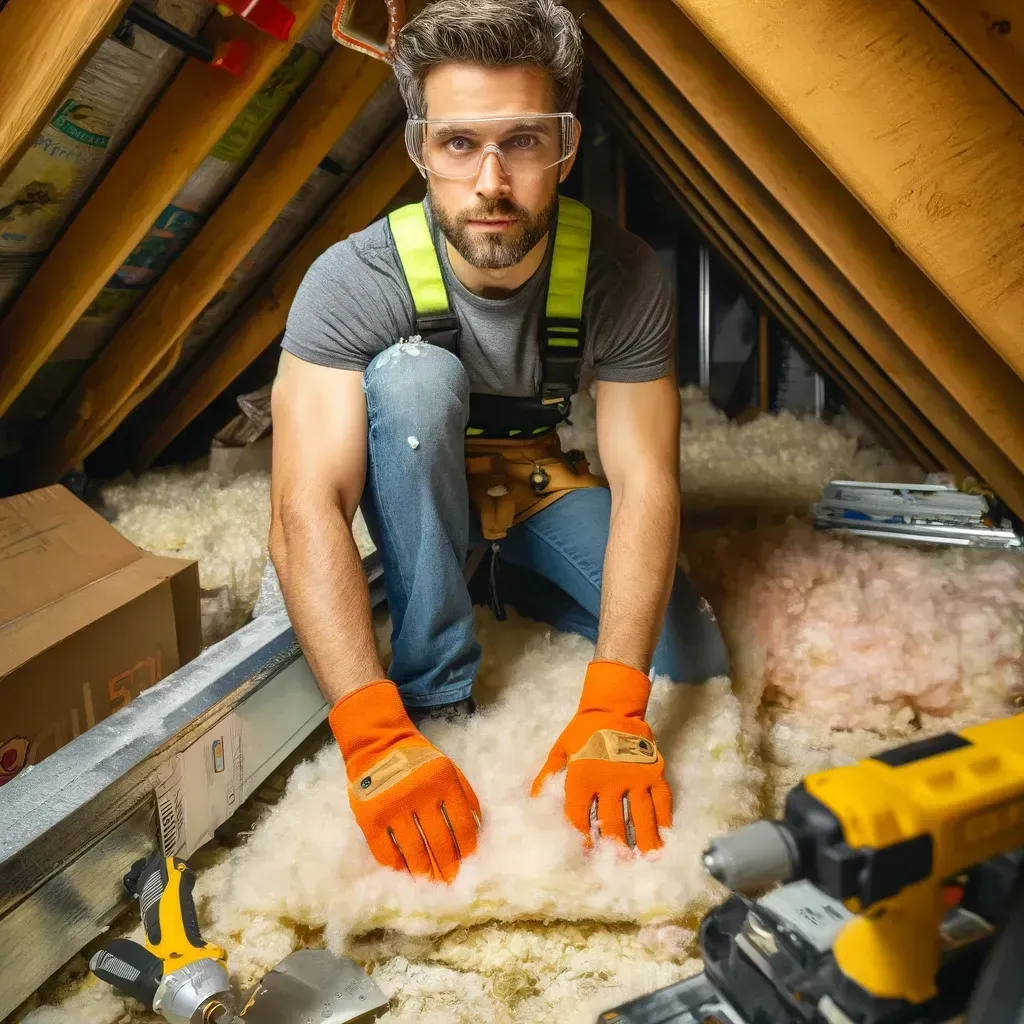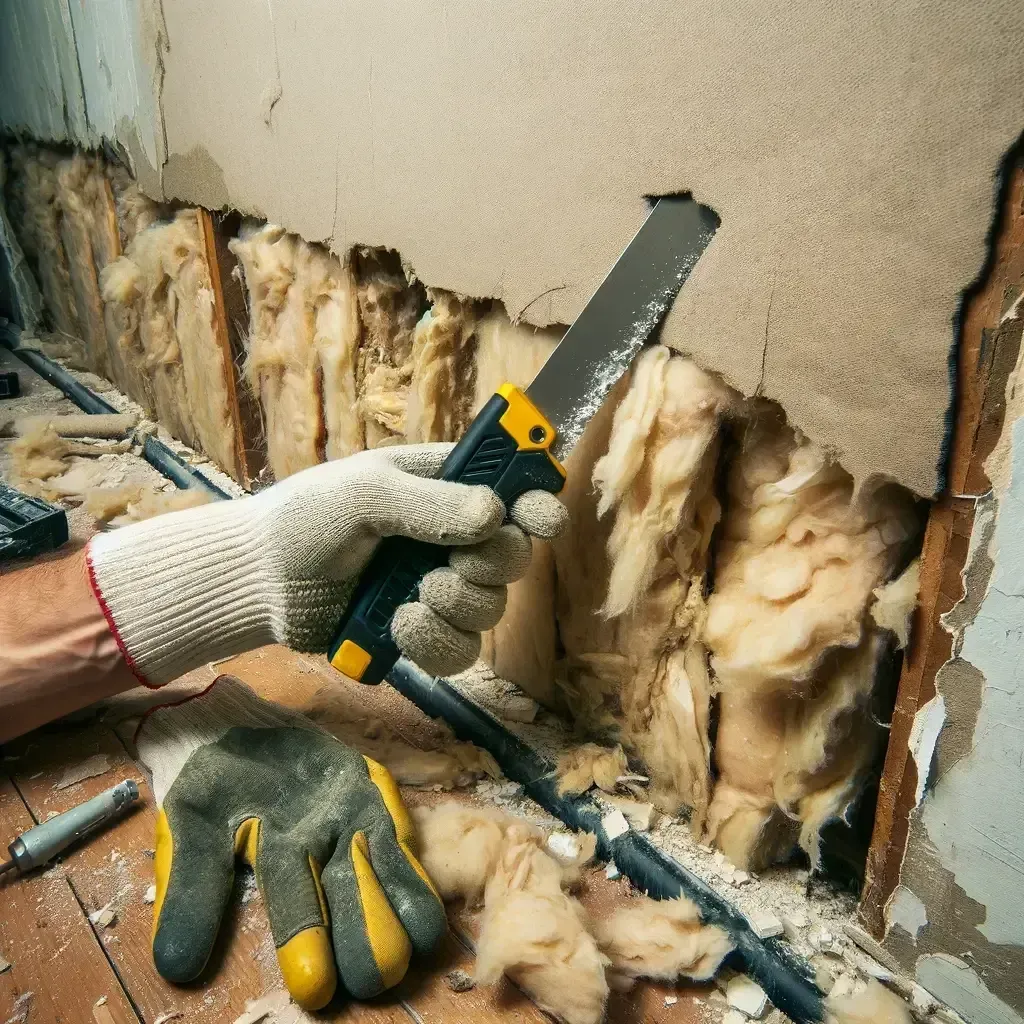Why Upgrading Your Attic Insulation Can Transform Your Home's Energy Efficiency
Why let your energy bills skyrocket when the solution, like radiant heat reduction and proper insulation in your attic space to keep your home cooler, could be right above you? Attic insulation, including insulating spray foam applied to the roof deck, is a game-changer for both new and older homes, acting as a barrier against the seasons' extremes and reducing convection. It's not just about keeping warm in winter or cool in summer; it's about making your home more energy-efficient and comfortable year-round through proper insulation, reducing heat transfer, and managing radiant heat. From reducing energy costs to improving indoor air quality, the significance of insulating attic insulation with spray foam on the roof deck cannot be overstated in keeping your home cooler.
Let's dive into why upgrading or installing proper attic insulation, like spray foam on the roof deck, should be at the top of your home improvement list to reduce heat transfer and protect your shingles.
Key Takeaways
- Attic insulation is crucial for both new and older homes to maintain energy efficiency, leading to significant cost savings on heating and cooling bills.
- Understanding how attic insulation works helps homeowners appreciate its role in minimizing heat transfer, thus keeping homes warmer in winter and cooler in summer.
- Proper attic insulation offers multiple benefits, including enhanced comfort, reduced energy consumption, and lower greenhouse gas emissions, contributing to a more sustainable environment.
- The efficiency of insulation is influenced by various factors, including the type of insulation material used, its thickness, and the overall integrity of the attic space.
- Homeowners can take proactive steps to ensure effective insulation by choosing the right materials, securing professional installation, and addressing any air leaks or moisture issues in the attic.
- Regular inspections and maintenance of attic insulation are essential to sustain its benefits over time, especially in older homes that might need upgrades to meet current energy efficiency standards.
Importance of Attic Insulation
Keep House Cooler
An insulated attic, with no gaps and properly installed shingles, plays a crucial role in reducing heat transfer and keeping your house cooler, thereby lowering cooling costs during the sweltering summer months. It reduces the need for air conditioning by trapping cool air inside, keeping the home cooler and minimizing heat transfer from the attic space, ultimately lowering cost. This not only saves energy but also lowers utility bills.
Insulation helps mitigate the Stack Effect. This phenomenon, involving heat transfer, causes warm air to rise and escape through the shingles in the attic, making your cooling system work harder and increasing cost. By sealing gaps and cracks, insulation maintains a consistent indoor temperature, providing relief from the heat outside.
Enhance Comfort
Attic insulation balances indoor temperatures, eliminating uncomfortable hot spots and cold drafts in different rooms. It absorbs sound and heat transfer as well, significantly reducing noise pollution and shingles from outside. This creates a quieter, more serene living environment.
By maintaining steady temperatures, insulation enhances overall comfort. It ensures that regardless of how hot or cold it is outside, the indoor conditions remain pleasant and stable.
Protect Home Structure
Moisture buildup in the attic, often due to compromised shingles, can lead to mold growth and wood rot, compromising the structural integrity of your home. Insulation prevents this by keeping excess moisture at bay.
It also shields your roof from extreme temperatures, prolonging its lifespan. Moreover, insulation reduces thermal stress on building materials. This minimizes expansion and contraction that could otherwise cause damage over time.
Improve Air Quality
A well-insulated attic blocks pollutants and allergens from entering your home. It seals off entry points for dust and pests, contributing to cleaner indoor air.
It lowers humidity levels in the attic space. This decreases the risk of mold and mildew growth, further improving air quality within your home.
How Attic Insulation Works
Basics of Insulation Cost vs Value
Insulation's effectiveness is measured by its R-value. This value tells us how well insulation can resist heat flow. Higher R-values mean better insulation performance.
There are several types of insulation materials for attics. These include fiberglass, cellulose, and foam. Each has its own benefits and ideal applications.
Heat moves in three ways: conduction, convection, and radiation. Insulation slows these processes, keeping homes comfortable. It acts as a barrier against unwanted heat loss or gain.
Summer Benefits
One major advantage of attic insulation in summer is lower energy bills. It reduces the need for air conditioning by keeping indoor temperatures stable.
It also extends the life of roofing materials. This is because it prevents them from getting too hot under the summer sun.
Furthermore, good attic insulation improves indoor air quality. It does this by blocking hot, polluted air from entering the home.
Winter Advantages
In winter, attic insulation helps retain heat inside the home. This means heating systems don't have to work as hard, saving on energy costs.
It also prevents ice dams on the roof. Even roof temperatures stop snow from melting and refreezing at the edges.
Moreover, insulation creates a barrier against cold air infiltration. This keeps living spaces warmer and more comfortable.
Benefits of Proper Attic Insulation
Cut Energy Costs
Proper attic insulation can significantly reduce heating and cooling expenses. It improves your home's thermal efficiency, making it easier to maintain comfortable temperatures. This means your heating and cooling systems don't have to work as hard, which lowers energy consumption.
By using less energy, homes also decrease their carbon footprint. This is crucial for those looking to live more sustainably. Plus, the savings from reduced utility bills make this a smart investment. Homeowners enjoy long-term savings from a one-time quality attic insulation upgrade.
Prolong HVAC Life
Quality attic insulation helps maintain a stable indoor temperature. This reduces the workload on your HVAC system. With less strain, there's a delay in the need for repairs and replacements.
This not only enhances system efficiency but also leads to smoother operation. Ultimately, it extends the lifespan of HVAC units. This benefit is especially important during extreme weather conditions when systems are most vulnerable.
Boost Property Value
Homes with proper attic insulation are more attractive on the market. They appeal to environmentally conscious buyers who prioritize lower operating costs. These features increase a property's marketability.
Proof of long-term cost savings and comfort improvements can sway potential buyers. Homes with energy-efficient upgrades often sell at higher prices. This makes attic insulation an investment that pays off not just in comfort but in financial returns too.
Factors Affecting Insulation Efficiency
Material Choice
Selecting the right insulation material is crucial. Look for high R-value, sustainability, and fire resistance. These factors determine how well insulation will perform in your attic.
Different materials suit different needs. For instance, fiberglass is common but may not be the best for moisture control. Cellulose and spray foam offer better options for attics needing better air sealing. Consider ventilation and moisture control in your decision.
Long-term benefits should outweigh initial costs. While fiberglass might be cheaper, spray foam offers superior air sealing and moisture protection. Evaluate both to see which meets your home's needs best.
Installation Quality
Proper installation ensures insulation works effectively. Avoid gaps and compression to prevent heat loss. Experienced professionals can assess your attic and install insulation correctly.
Uniform coverage is essential. It eliminates thermal bridging, where heat escapes through less insulated areas. Make sure the entire attic is evenly covered for maximum efficiency.
Home Age and Design
Older homes face unique challenges like poor original insulation or ventilation problems. Address these issues when upgrading attic insulation.
Insulation solutions must match your home's design and materials. This tailored approach improves energy efficiency significantly.
Upgrading attic insulation in older homes requires a comprehensive strategy that considers all aspects of energy efficiency.
Steps to Ensure Effective Insulation
Assess Adequacy
To gauge if your home has proper insulation, conducting an energy audit is a critical first step. This process helps identify the current insulation levels and spots needing enhancement. Professionals use infrared cameras during these audits, offering a clear visual of where heat loss and air leaks are occurring.
Moreover, it's essential not to overlook the attic's ventilation. Proper ventilation prevents moisture issues, which can undermine insulation effectiveness. Balancing insulation with adequate airflow ensures a healthier living environment.
Optimize Efficiency
For optimal energy savings, combining air sealing with insulation is non-negotiable. This approach addresses two major fronts: preventing unwanted airflow and maintaining the desired indoor temperature. It's also crucial to check that vents remain unblocked by insulation. This keeps attic ventilation functioning as intended.
Regular reviews and upgrades of your attic insulation can lead to significant energy savings over time. Advances in insulation materials and changes in building codes make periodic updates beneficial for homeowners.
Ensure Correct Sealing
Sealing potential leak points like attic access doors, ductwork, and chimneys is vital for maintaining energy efficiency. Different gaps require specific materials such as caulk or foam sealant for effective sealing.
It's advisable to inspect these seals regularly for wear and tear. Reapplying sealants as necessary aids in preserving the integrity of your home’s thermal barrier.
Final Remarks
Attic insulation isn't just another item on your home maintenance checklist; it's a crucial step towards energy efficiency, comfort, and cost savings. Whether your home is brand new or has seen decades pass by its walls, effective attic insulation plays a pivotal role in maintaining temperature, reducing energy bills, and enhancing your living environment. The benefits are clear: from the warmth in winter to the cool in summer, and not forgetting the lower energy bills that come with an efficiently insulated home.
Taking action now to check, upgrade, or install proper attic insulation can lead to significant improvements in your home's performance and your quality of life. Don't overlook this essential aspect of home care. Reach out to a professional, assess your current insulation situation, and take steps towards an energy-efficient future. Your home—and your wallet—will thank you.
Frequently Asked Questions
Why is attic insulation, including spray foam on the roof deck to prevent convection, crucial for insulating both new and older homes?
Attic insulation is vital because it helps maintain a home's temperature, reducing energy costs and increasing comfort by preventing heat loss in winter and heat gain in summer.
How does attic insulation work?
Attic insulation traps air within its fibers or foam, creating a barrier that reduces the flow of heat, keeping your home warmer in winter and cooler in summer.
What are the benefits of proper attic insulation?
Proper attic insulation leads to lower utility bills, enhanced indoor comfort, reduced carbon footprint, and prolonged HVAC system lifespan by easing its workload.
What factors affect the efficiency of attic insulation?
Insulation efficiency is influenced by material type, thickness, installation quality, and the home's age. Ensuring these factors are optimized improves insulation performance.
What steps can ensure effective attic insulation?
To ensure effective attic insulation, start with an energy audit, choose the right insulation material and R-value for your climate, seal any air leaks, and consider professional installation for best results.
Can upgrading attic insulation increase my home's value?
Yes, upgrading attic insulation can increase your home's value by improving energy efficiency and comfort, making it more attractive to potential buyers.


